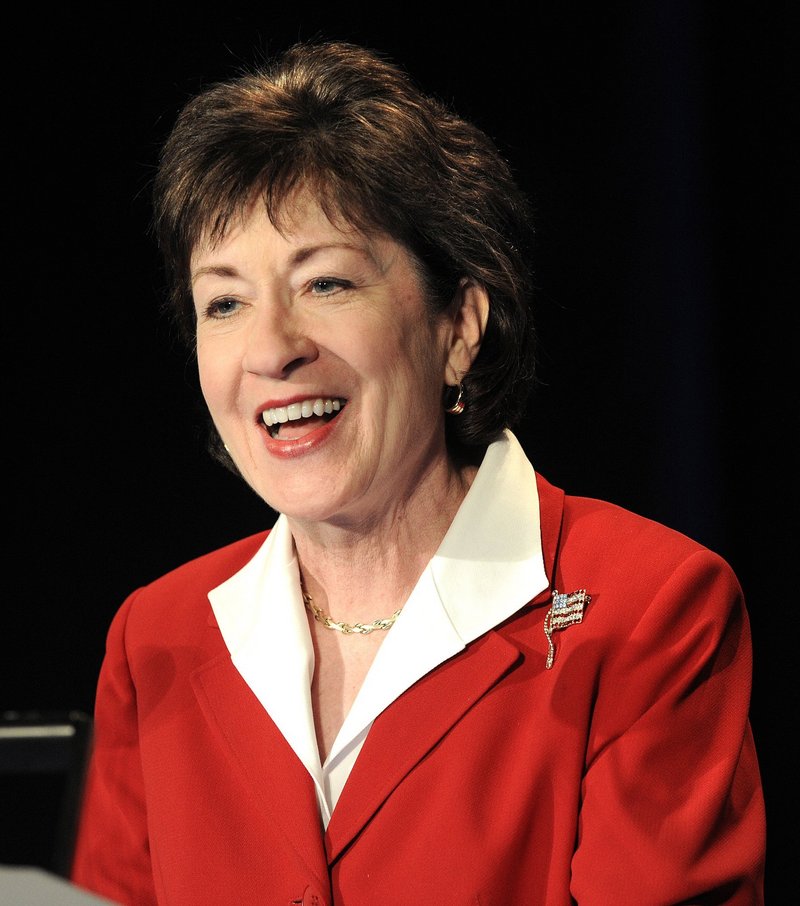WASHINGTON — Three members of Maine’s congressional delegation are urging the Supreme Court to strike down a law that denies federal benefits to same-sex couples, but Republican Sen. Susan Collins continues to hedge on the closely watched social issue.
“Senator Collins will carefully follow the Supreme Court’s consideration of this important case,” Collins’ spokesman, Kevin Kelley, said on Friday when asked about the pending court hearings on same-sex marriage.
Reps. Chellie Pingree and Mike Michaud and Sen. Angus King were among 212 Democratic or independent members of Congress who joined a “friend of the court” or amicus brief in support of ending the Defense of Marriage Act, or DOMA.
Signed into law in 1996 by President Bill Clinton, DOMA explicitly defines marriage as “only a legal union between one man and one woman.” That language means that gay and lesbian partners in Maine and other states that allow same-sex marriage are still treated differently from heterosexual married couples when it comes to Social Security and veterans’ benefits, immigration, taxes and other federal programs.
“DOMA imposes a sweeping and unjustifiable federal disability on married same-sex couples,” reads the brief, one of dozens filed ahead of this month’s hearings on the constitutionality of DOMA and a California ban on gay marriage. “It is ‘class legislation’ that lacks any rational connection to legitimate federal interests, thus violating the Fifth Amendment’s equal-protection guarantee.”
A socially moderate Republican, Collins has earned praise from gay rights groups for her past leadership on issues important to the lesbian, gay, bisexual and transgendered, or LGBT, community. However, Collins did not offer a position Friday on DOMA or the other Supreme Court case challenging the constitutionality of California’s ban on gay marriage.
In a written response, Kelley noted that DOMA was signed into law prior to Collins’ election in November 1996. Since then, she voted against proposals in 2004 and 2006 for amendments to the U.S. Constitution to restrict marriage to unions between one man and one woman.
“Senator Collins voted against these federal constitutional amendments defining marriage because she believes the issue of same-sex marriage is best addressed by the individual states, as the voters of Maine decided in November,” Kelley said. “Recognizing that LGBT Americans should be protected from discrimination, Senator Collins has led efforts in Congress to extend federal benefits to gay men and women and their families.”
Collins faces re-election in 2014, and there has been persistent speculation about whether she will face a primary challenge from the conservative or tea party wings of the Republican party. But attitudes toward same-sex marriage in Maine appear to be steadily shifting, as evidenced by last November’s vote and the lack of controversy since the nuptial ceremonies began last year.
And despite her reluctance to weigh in on the Supreme Court cases, Collins has not shied away from publicly supporting changes to federal laws criticized as discriminatory against the LGBT community, including some dealt with in the DOMA case.
In 2010, she and now-retired Sen. Joseph Lieberman, I-Conn., co-sponsored the Senate measure that ended the “Don’t ask, don’t tell” policy prohibiting gays and lesbians from serving openly in the military. Collins also has sponsored or supported bills to allow domestic partners of federal employees to receive federal benefits and to prohibit job discrimination based on sexual orientation
Collins is currently the primary co-sponsor — and the only Republican sponsor — of a bill that would treat same-sex “permanent partners” the same as traditional couples when it comes to immigration law. For instance, the Uniting American Families Act would allow a gay or lesbian U.S. citizen to sponsor a foreign-born spouse for a green card, just as is currently allowed for heterosexual married couples.
Those past actions are encouraging to groups hoping that the high court will overturn DOMA.
“We are very grateful to the three members of our delegation who signed the DOMA ‘friend of the court’ brief,” Ian Grady, spokesman for the organization Equality Maine, said Friday. “We are looking forward to having a conversation with Senator Collins about how DOMA is hurting same-sex couples in Maine. And we are optimistic about that conversation because of her past support for LGBT issues and her support for the Uniting American Families Act.”
The DOMA case involves an elderly Connecticut woman, Edith Windsor, who had to pay more than $300,000 in federal estate taxes after the death of her partner of 40-plus years, to whom she was legally wedded.
The California case, which will be heard first by the Supreme Court, seeks to overturn that state’s Proposition 8 referendum outlawing same-sex marriage but could be broadened to apply to states with similar prohibitions.
More than 100 Republicans who have held higher office, held leadership positions or served in top government jobs filed an amicus brief on Friday urging the court to overturn Proposition 8. Mark Ellis, a former chairman of the Maine Republican Party who is still involved in state politics, was among the signatories.
Kevin Miller — 317-6256
kmiller@mainetoday.com
Twitter: @KevinMillerDC
Send questions/comments to the editors.




Success. Please wait for the page to reload. If the page does not reload within 5 seconds, please refresh the page.
Enter your email and password to access comments.
Hi, to comment on stories you must . This profile is in addition to your subscription and website login.
Already have a commenting profile? .
Invalid username/password.
Please check your email to confirm and complete your registration.
Only subscribers are eligible to post comments. Please subscribe or login first for digital access. Here’s why.
Use the form below to reset your password. When you've submitted your account email, we will send an email with a reset code.